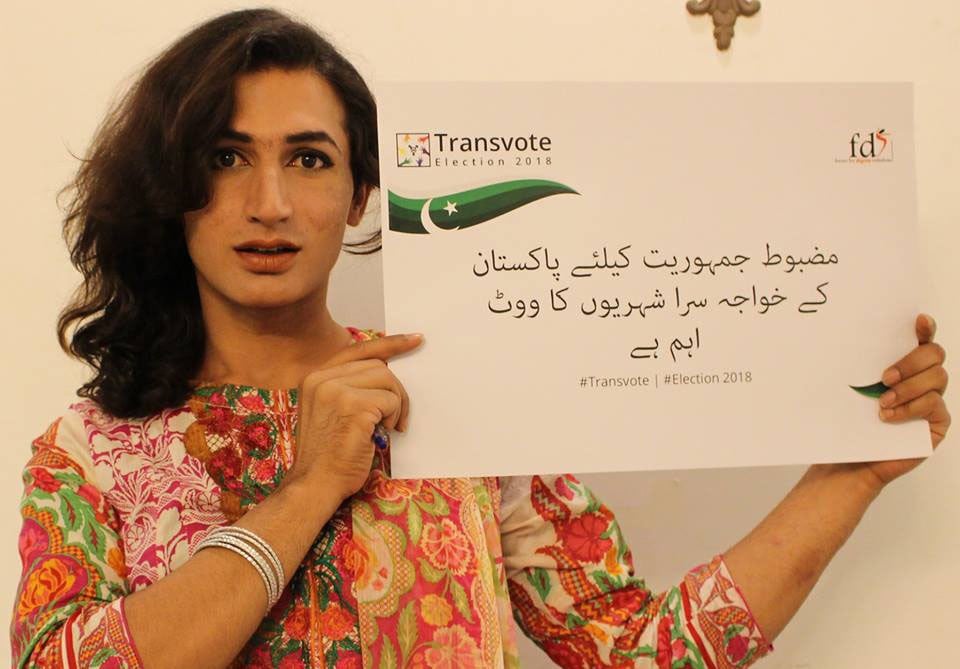
Transgender people are contesting in general elections 2018 with the hope to change attitudes

Nayyab Ali dreamt of being a doctor but gave up her dreams after being abandoned by her family when they discovered that she was a transgender person.
Ali had a hard life, and despite earning a Bachelor’s degree in Botany from the University of Punjab, she had to perform at events to earn a living. During one such performance, someone threw acid on her, burning her neck and upper body. After recovering from the burns she started working for the betterment of her community and now has big plans ahead.
This year, Ali, who is from Okara, along with Julie Khan and Nadeem Kashish, transgender people from Islamabad, are making history by contesting elections for the National Assembly for the first time.
In 2013, transgender persons Resham and Lubna Lal from Jhelum, Bindya Rana from Karachi, Sanam Faqeer from Sukkur and Madam Bhutta from Okara contested for provincial assembly seats. The buildup for the 2013 election actually began in December 2009, the Supreme Court of Pakistan ordered NADRA to issue ID cards to transgender persons and include their names in electoral rolls so they could take part in elections. On May 8, 2018 another milestone was achieved when the Transgender Persons (Protection of Rights) Act, 2018 was passed by the national assembly.
Political parties are nominating candidates for constituencies across Pakistan but none of the main political parties have approached Ali, Julie Khan or Kashish to contest elections.
In this back drop, Ayesha Gulalai from Khyber Pakhtunkhwa, previously a member of the Pakistan Tehreek-e-Insaf, and currently the head of the Pakistan Tehreek-e-Insaf (Gulalai), has given tickets to four transgender persons: Madam Rani from Haripur PK 40, Lubna Lal from Jhelum PP 26, Nayyab Ali from Okara for NA-142, and Nadeem Kashish from Islamabad for NA 53 to contest as party candidates.
Khan from Islamabad NA-53, Kashish from Islamabad NA-53, Lal from Jhelum PP-26, Ali from Okara NA141 and Maria Khan from Manshera PP31 have filed their nomination papers. The ECP has accepted Ali and Lal’s papers while they have called in Julie and Kashish next week.
However, there is a group of transgender people who have boycotted the upcoming elections because there is no column for transgender person in the nomination forms. Bindya Rana from Karachi, Neeli Rana and Ashee Jan from Lahore are amongst those boycotting. Another issue they have is of casting votes in their own areas that they were forced to leave because of harassment.
"I am very grateful to PTI-G for giving us tickets without charging application fee, however, we have not received any help to run our election campaign. How will I contest the elections? Even though I am working at a news channel as a make-up artist I find it difficult to bear the expenses. I think I should contest the elections as an independent rather than a party candidate," says Kashish. Ali seconds Kashish’s comments.
In response to these demands, Nafeesa Khattak of PTI and Osho Uzma from PPP have assured the community that they will lobby within their party for setting up a transgender wing soon so they can contest the next elections under the party banner.
Hina Butt, a former MPA from Pakistan Muslim League Nawaz said, "PML-N has passed the Transgender Persons (Protection of Rights) Act, 2018 and given them right to life, property, employment, medical facility and education." But regarding tickets she said, "It all depends on the party. I am not part of the committee."
Every political party presents a manifesto for elections. Transgender persons also have a manifesto which is related to their communities and includes education for all. Ali says, "A law needs to be formalised by which parents should accept and keep their transgender children till they reach 18 years of age. No transgender should be forced to be a part of the Guru culture."
Julie Khan will contest from NA-53 against PTI Chairman Imran Khan as an independent candidate. "It will be a tough competition," she says. She aims to work for minorities in the society and for right to education for all citizens.
Initially, more than 14 transgender persons planned to contest upcoming elections. However, a number of them backed out because they did not have the resources to even file the papers, while others cited personal issues. Many also faced backlash from the community, especially those advocating to diminish the Guru-Chela system.
"The transgender people running for this election are community leaders. But our election social media campaign is not getting attention, people’s priorities are not in place. The transgender people have taken a huge step and need encouragement and confidence," says Uzma Yaqoob of Forum of Dignity Initiative, who is running a social media campaign for transgender people contesting elections.
Recently, things have been improving for this much ostracised community, many non-profits have been working for their rights. However, there is much work to be done. According to the latest report of TransAction, between 2015-2017, at least 54 transgender people were killed.
Community members running for this election, are well aware that they hardly have any chance of winning, but they continue to persevere. They say it will also help them prepare for participation in the next local body elections. By then, they plan to have their own political party.